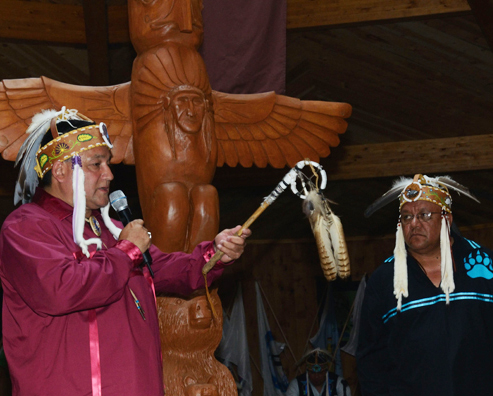OUR TIME IS NOW: Madahbee

UOI Offices –This year marks the 250th anniversary of The Royal Proclamation, a landmark document by which the British Crown recognized the nationhood of “the Indian tribes of North America.”
Commemoration of the 1763 event is an agenda item for June’s annual general assembly of Anishinabek Nation chiefs, and Grand Council Chief Patrick Madahbee reflected on the persistence of First Nations during that time.
“When our chiefs met the representative of the Crown back then, there was no doubt that we were capable of managing our own affairs, governing our own communities –the British representatives were well aware of our ability to assert our jurisdiction because, when push came to shove, First Nation warriors devastated nine of eleven British Forts in Pontiac’s War.
“Today we have an opportunity to demonstrate the same kind of persistence by proving that we can govern ourselves, and telling other governments that we don’t need them to tell us how to look after our citizens.”
A key agenda item at the June 3-6 assembly in Munsee-Delaware will be the future of the Anishinabek Education System, which is intended to restore jurisdiction for education of some 2500 K-12 Anishinabek Nation students. Half a day on the three-day agenda is being set aside for a discussion by chiefs, who are expected to endorse a plan that would launch the education system in April, 2014.
Madahbee pointed to the recent stream of Harper government legislation that ignores First Nations jurisdiction on everything from First Nations election processes to matrimonial real property rights.
“We need to start occupying the field in these areas – we’ve got to get moving on some of these issues. Our organization has engaged every Anishinabek community in developing our own templates for citizenship and matrimonial property laws. The Anishinabek Nation has developed the tools necessary to build governance institutions in our own communities.”
The Grand Council Chief used the development of the Anishinabek Chi-Naaknigewan as an example of important governance groundwork that had been put in place, but not pursued as actively as it could have been.
“We understood that some of our communities required more time to review this important process – to create a constitution that provides the framework for our law-making authority as a nation. Our leaders collectively decided the process needed another year’s study, and the document we proclaimed at last year’s assembly included the amendments from a year earlier.”
Madahbee said that time was of the essence in implementing key governance issues or First Nations could find themselves dealing with situations where, for example, in the event of marital breakups, the province will be making decisions on-reserve and as a result, non-native spouses may end up with owning the on-reserve property.
“We can no longer afford to allow foreign governments to decide who our citizens are, or about the process of First Nations elections.”
He cited child welfare as another area where Anishinabek leaders have an opportunity for implementation, in this case about the importance of the principle of “customary care”.
“No kid should ever be placed in care outside our communities. They could be placed with members of the immediate family, the extended family – even in neighbouring First Nations. Our kids are being placed in homes as far away as England!
“We can either assert our jurisdiction or we can complain about government laws being imposed on us. The status quo hasn’t worked.
“OUR TIME IS NOW. IT’S TIME TO DO SOMETHING NOW.”
For more information on this June’s Grand Council Assembly, contact Leah Stock – (705) 497-9127.


